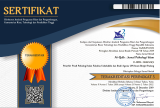FACTORS THAT INFLUENCE GRATITUDE
Abstract
Keywords
Full Text:
PDFReferences
Al-Bukhari. (2002). Shahih Al-Bukhari. Jakarta: Pustaka Azzam.
Al-Ghazali. (1977). Mutiara Ihya’ Ulumuddin. Bandung: Mizan.
Anwar, I. (2010). Pengembangan Bahan Ajar. Bandung: UPI.
Emmons, R. A., & McCullough, M. E. (2003). Counting Blessing Versus Burdens: An Experimental Investigation of Gratitude and Subjective Well-Being In Daily Life. Journal of Personality and Social Pshychology, 84 (2), 377-389.
Emmons , R. A., McCullough, M. E., & Tsang, J. A. (2004). Gratitude in Intermediate Affective Terrain: Links of Grateful Moods to Individual Differences and Daily Emotional Experience. Journal of Personality and Social Psychology, 86, 295-309.
Fauziyah, D. U., & Abidin, Z. (2020). Hubungan Antara Gratitude dengan Psychological Well-Being Pada Mahasiswa Bidikmisi Angkatan 2016 Universitas Diponegoro Semarang. Jurnal Empati, 8 (3), 138-143.
Froh, J. J., Bono, G., & Emmons, R. (2010). Being Grateful is Beyond Good Manner: Gratitude and Motivation to Contribute to Society Among Early Adolescence. Motivation and Emotion,, 34 (2), 144-157.
Hambali, A., Meiza, A., & Fahmi, I. (2015). Faktor-faktor yang Berpengaruh dalam Kebersyukuran (Gratitude) pada Orang Tua Anak Berkebutuhan Khusus Perspektif Psikologi Islam. Psympathic: Jurnal Ilmiah Psikologi Islam, 2 (1), 94-101.
Karimulloh, Grasiaswaty, N., & Caninsti, R. (2021). Tiga Tema Konsep Kebersyukuran dalam Perspektif Al-Qur'an: Sebuah Literatur Review. jurnal studi al-qur'an membangun tradisi berfikir qur'ani, 17 (2), 252-263.
Kashdan, T. B., Mishra, A., Breen, W. E., & Froh, J. J. (2009). Gender differences ingratitude: Examining appraisals, narratives, the willingness to express emotionsandchanges in sychological needs. journal of personality, 77 (3), 691-730.
Kristanto, E. (2016). Perbedaan Tingkat Kebersyukuran pada Laki-laki dan Perempuan. Seminar ASEAN 2nd Psychology & Humanity (p. 131). Malang: Psychology Forum UMM.
Lyumbomirsky, S., Armenta, C. N., & Fritz, M. M. (2016). Functions of Positive Emotions: Gratitude as A Motivator of Self Improvement and Positive Change. Emotion Review, 1 (8), 183-190.
Maulidah, I. L. (2016). Kebersyukuran dan Kemaknaan Hidup Pada Penderita Jantung Koroner. Psycho Idea, 14 (2).
McCullough, M. E., Emmons, R. A., & Tsang, J. (2002). The Drateful Dispotion: A Conceptual and Empirical Topography. Journal of Personality and Social Psychology, 82 (1), 112-127.
Peterson, C., & Seligman, M. E. (2005). Character Strengths and Virtues: A Handbook and Classification. Washington DC: American Psychological Assosiation.
Petrocchi, N., & Couyoumdjian, A. (2016). The Impact of Gratitude on Deppression and Anxiety: The Mediating Role of Criticizing, Attacking, and Reassuring The Self. Self and Identity, 15 (2), 191-205.
Seligman, M. E. P. (2005). Menciptakan Kebahagiaan dengan Psikologi Pasif Authentic Happiness. Bandung: PT. Mizan Pustaka.
Siswanto. (2010). Metodologi Penelitian Kesehatan Kedokteran. Yogyakarta: Bursa Ilmu.
Sulistyarini, R. I. (2010). Terapi Kebersyukuran Untuk Meningkatkan Proactive Coping Pada Survivor Bencana Gunung Merapi. Yogyakarta: Universitas Islam Indonesia.
Watkins, P. C., Woodwart, K., Stone, K., & Kotls, R. L. (2003). Social Behavior & Personality: An International Journal. Gratitude and Happiness Development of A Measure of Gratitude, and Relationship with Subjective Well-Being, 31, 431-452.
Wood, A. M., Joseph, S., & Maltby, J. (2009). Personality and Individual Differences. Gratitude Predicts Psychological Well-Being Above The Big Five Facets, 46, 443-447.
Refbacks
- There are currently no refbacks.
Ruang Jurnal,
Fakultas Ushuluddin dan Studi Agama,
UIN Imam Bonjol Padang
Jl. Mahmud Yunus No.6,Lubuk Lintah,
Kota Padang, Sumatra Barat
E-mail: jurnal-alqalb@uinib.ac.id

This work is licensed under a Creative Commons Attribution-ShareAlike 4.0 International License.



